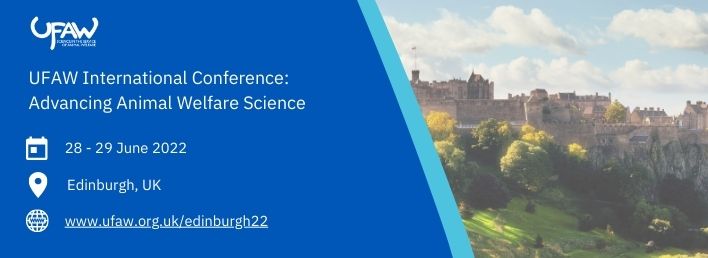
For the first time since the start of the COVID pandemic, UFAW’s international conference was held in-person, allowing attendees the opportunity to network with their colleagues face-to-face. We welcomed 231 in-person delegates to the Royal College of Physicians Edinburgh for the two-day event.
For those colleagues who were unable to join us in person, talks were live-streamed and posters were also hosted online, allowing a further 445 attendees to join the conference virtually.
The programme featured eight sessions over the two days, including 28 submitted talks, 70 poster presentations and four keynote presentations:
- Professor Melissa Bateson (Newcatle University, UK) spoke to delegates about the use and misuse of measures of welfare.
- Professor Bas Rodenburg (Utrecht University, The Netherlands) considered how to meet the demands of a growing human population while also achieving good animal welfare.
- Professor Hanno Würbel (University of Bern, Switzerland) explained how to improve the quality of animal welfare science.
- Professor Cathy Dwyer (University of Edinburgh, UK and Chair, Scottish Animal Welfare Commission) explained the role of evidence in policy making.
Attendees also heard from the 2022 winners of the UFAW Medal for Outstanding Contributions (Professor Jane Hurst, University of Liverpool, UK) and the Early Career Researchers of the Year (Dr Jessica Martin, University of Edinburgh, UK and Dr Nienke Van Staaveren, University of Guelph, Canada), who were presented with their awards during the conference.
The conference also included a workshop and a debate forum exclusively for in-person delegates. The workshop, led by Professor Melissa Bateson (Newcastle University, UK), considered how to improve study design in animal welfare research. The debate forum considered the pros, cons and the challenges associated with animal welfare labelling of food products. A summary of the debate forum can be found here.
We would like to thank all those who contributed to the conference, as staff, speakers, chairs and delegates.
Abstracts for all the talks and the posters can be found on this webpage, and recordings of all the talks can be found on our YouTube channel here. The recordings of the talks are free to view, but if you are able to, please consider making a donation to support Science in the Service of Animal Welfare. None of our work, including this conference, would be possible without the generosity of our members and supporters.
Contact Details:
Dr Stephen Wickens, UFAW, The Old School, Brewhouse Hill, Wheathampstead, Hertfordshire, AL4 8AN, UK.
Tel: +44 (0) 1582 831818; Fax: +44 (0) 1582 831414; Website: www.ufaw.org.uk; Email: events@ufaw.org.uk

